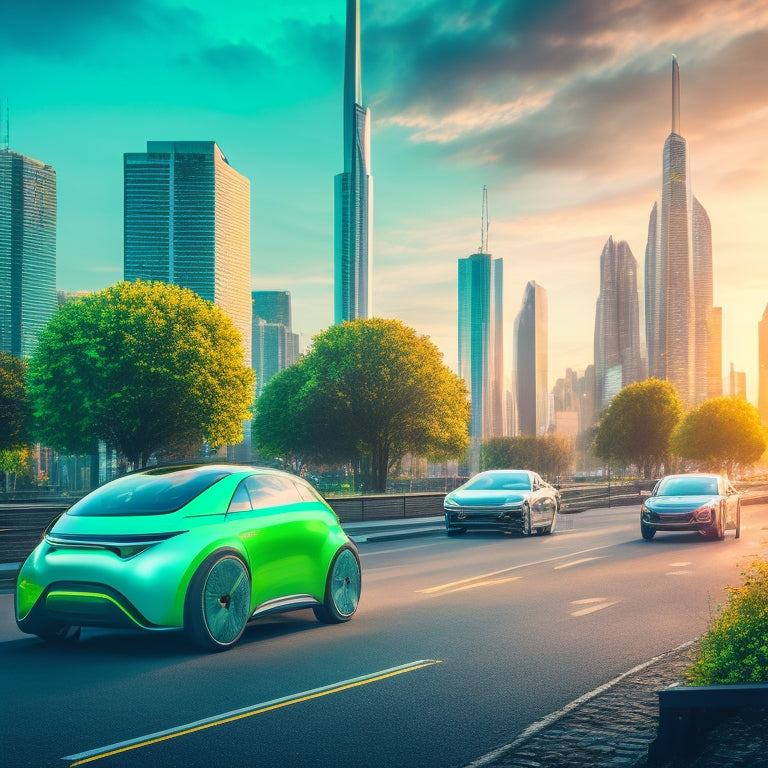
Global Shift: Electric Cars Dominate Auto Market Ahead
Share
By 2030, electric vehicles are poised to dominate the global automotive market, with projections indicating that they will account for a staggering 65% of new vehicle sales worldwide. This shift is driven by advancements in battery technology, making electric vehicles more affordable, and government incentives promoting sustainable transportation. Regional leaders like China and Europe are setting the stage for a global shift, with even states like Colorado seeing significant growth in electric vehicle sales. As the market continues to evolve, overcoming challenges like range anxiety and limited model options will be pivotal to widespread adoption - and there's more to explore in this transformative journey.
Key Takeaways
• By 2030, electric cars are projected to constitute 65% of new vehicle sales globally, driven by declining battery prices and growing demand.
• Europe and China are leading the electric vehicle market, with China's surge driven by government incentives and investments in EV infrastructure.
• The global shift towards electric vehicles is expected to displace an estimated 2.7 million barrels of oil daily by 2030, transforming the automotive industry.
• Regional success in EV adoption, such as in Colorado, sets the stage for a global shift towards electric vehicles, with blue states leading the electrification efforts.
• Overcoming growth barriers, including range anxiety and limited model options, is crucial for widespread EV adoption and market expansion.
Electric Vehicle Market Trends
By 2030, electric cars are projected to constitute 65% of new vehicle sales globally, with this figure rising to 85% by 2035, according to Enverus predictions.
This rapid adoption is driven by advancements in battery technology, which has led to declining prices, making electric vehicles more affordable. As a result, the market share of electric vehicles has been growing steadily, with Europe and China leading the charge.
In 2022, electric vehicles accounted for about 10% of new sales worldwide. The shift towards electric vehicles is expected to have a significant impact on the oil industry, with an estimated 2.7 million barrels of oil displaced daily by 2030, rising to 5.2 million barrels by 2035.
Regional EV Adoption Patterns
China and Europe are spearheading electric vehicle (EV) adoption, with China experiencing a remarkable surge in EV sales, from 5% in 2020 to 22% in 2022, while the United States lags behind, with EVs comprising nearly 6% of new sales in 2022. This regional disparity in EV adoption patterns is significant.
Europe's fleet growth and lower resistance to EV adoption contribute to its regional success.
China's remarkable surge in EV sales is driven by government incentives and investments in EV infrastructure.
The US lags behind due to consumer concerns about cost and range anxiety, hindering its regional success in EV adoption.
Regional success in EV adoption is critical for a global comparison, as it sets the stage for a global shift towards electric vehicles.
Colorado's Electric Shift
In 2022, Colorado witnessed a significant surge in electric vehicle sales, with battery-only vehicles and plug-in hybrids accounting for 10.5% of registrations, marking a notable shift towards electrification in the state.
This growing interest in electric vehicles is largely driven by state initiatives aimed at promoting sustainable transportation. Governor Jared Polis has set an ambitious goal of having 940,000 electric or clean-technology vehicles on Colorado roads by 2030.
To achieve this, the state is considering extending clean-car rules to include medium- and heavy-duty vehicles. As a result, Colorado is following a trend of blue states leading in electrification efforts, with a rising interest in EVs expected to continue in the state.
Challenges in the EV Market
Cold weather's debilitating impact on electric vehicle performance, with batteries losing up to 20% of their capacity, contributes to consumer anxiety in the US market. This reduction in battery performance exacerbates existing concerns about range anxiety, ultimately hindering widespread adoption.
Automakers struggle to meet the surging demand for electric trucks and SUVs, leaving consumers in need of more options.
The industry's inability to keep up with demand for electric vehicles fuels frustration among potential buyers.
Concerns about battery performance in cold weather contribute to consumer anxiety, casting a shadow over the EV market's growth prospects.
Overcoming Barriers to Growth
To overcome the growth barriers hindering widespread EV adoption, manufacturers and policymakers must address the lingering concerns about battery performance, range anxiety, and limited model options.
Improving batteries' performance, particularly in cold weather, is essential to alleviate consumer anxiety. Manufacturers can achieve this by investing in research and development of advanced battery technologies.
Additionally, policymakers can incentivize the development of fast-charging infrastructure to reduce range anxiety.
Moreover, increasing the variety of electric models available can cater to diverse consumer preferences, driving up demand.
Frequently Asked Questions
How Will Governments Incentivize EV Adoption Beyond 2030?
Governments can incentivize EV adoption beyond 2030 by offering tax breaks, green credits, and investment in EV infrastructure, while also implementing policies to encourage sustainable manufacturing and battery recycling.
Will Autonomous Driving Technology Integrate With Electric Vehicles?
As autonomous driving technology integrates with electric vehicles, cybersecurity risks will emerge, particularly in supply chains, necessitating robust security protocols to safeguard sensitive data and guarantee seamless communication between vehicles, infrastructure, and users.
Can Electric Motorcycles Gain Traction in the EV Market?
Electric motorcycles can gain traction in the EV market by leveraging ride-sharing platforms and offering performance upgrades, enhancing their appeal to environmentally conscious consumers seeking thrilling, eco-friendly transportation options.
Will Charging Infrastructure Keep Pace With Growing EV Demand?
As EV adoption accelerates, charging infrastructure must keep pace; rural accessibility, grid capacity, and urban planning are vital, necessitating strategic power distribution and station density to guarantee seamless charging experiences, particularly in underserved areas.
Can Recycling of EV Batteries Become a Profitable Industry?
As the EV market grows, recycling of EV batteries can become a profitable industry by implementing closed-loop systems and battery refurbishment, reducing waste and costs, and generating new revenue streams through sustainable practices.
Related Posts
-

What Cool Roof Tax Breaks Can Homeowners Claim?
You can claim federal tax credits of up to $500 and state and local incentives for installing cool roofs, which not o...
-

7 Best Home Hydrogen Fuel Cells for Clean Power
You're considering adopting hydrogen fuel cells for clean power at home, but you want to know the best options. Reput...
-

7 Best Solar Panel Upkeep Apps for Homeowners
You can optimize your solar panel's energy output and efficiency by up to 20% with regular maintenance, which is wher...


